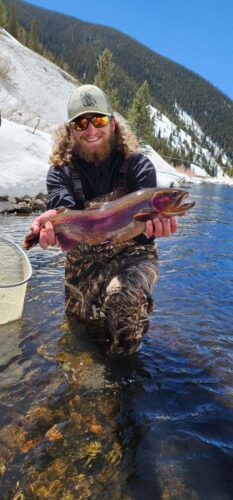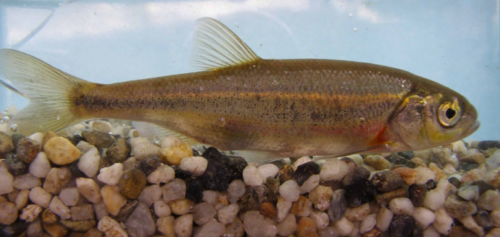For as long as he can remember, fish and the lakes and streams they live in have been a passion for Tim Franke. As a student at Western Colorado University, Franke brought his deep, lifelong interest in fish to his studies – and also to Wikipedia!
“I have always wanted to be part of making the environment and fishing better,” explained Franke, who graduated in May with a bachelor’s degree in Fisheries and Aquatic Biology.

Before enrolling in Derek Houston’s Ichthyology Laboratory course this spring, Franke might not have considered editing Wikipedia as a strategy for this goal. Now, he sees the impact he can make by increasing public access to high-quality, robust information about a topic he loves.
“Having correct information at your fingertips can make a world of difference when making decisions,” said Franke, who was surprised to learn of the rigorous nature of Wikipedia’s editing policies and guidelines.
For his Wikipedia assignment, Franke chose to focus his work on the redside shiner, a small freshwater fish found in the Western United States and British Columbia – a “brave selection” his professor jokingly noted, considering it was one of his own areas of expertise.
Franke, however, was more than up to the challenge, expanding the existing single sentence about the species to an informative article with new sections on habitat and distribution, morphology, life cycle, and conservation status, as well as expanding the set of references.
“It’s not just the large fish that are interesting,” explained Franke. “There are plenty of smaller fishes that don’t get represented.”
To pull off this complete transformation of the text, Franke spent significant time combing through books and research articles to learn as much as he could about the redside shiner.

While doing his research, Franke recognized discrepancies in research access – his university credentials granted him access to information that others could not see.
“[My research] has opened my eyes to the amount of information that is not immediately available to the public,” said Franke. “Knowing that my efforts were going to be enjoyed by more than just myself was absolutely the best part of editing Wikipedia.”
Franke now works at a fish hatchery in Colorado and plans to continue to improve Wikipedia in the future, hoping to interest and educate others about fish and their environments.
Our support for STEM classes like Tim’s is available thanks to the Guru Krupa Foundation.
Interested in incorporating a Wikipedia assignment into your course? Visit teach.wikiedu.org to learn more about the free resources, digital tools, and staff support that Wiki Education offers to postsecondary instructors in the United States and Canada. Apply by September 8 for the fall 2024 term!
